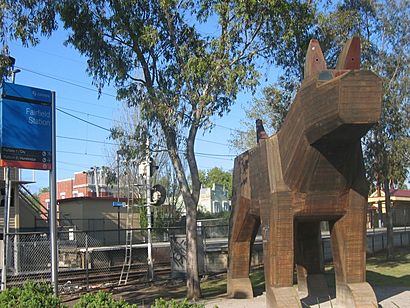Fairfield Industrial Dog Object facts for kids
The Fairfield Industrial Dog Object (often called FIDO) is a giant wooden sculpture of a dog. You can find it in Fairfield, a suburb of Melbourne, Victoria, Australia. This cool artwork was created as part of the Darebin City Council's Public Art Program. It stands right next to the Fairfield railway station.
Contents
How FIDO Was Developed
FIDO was first announced in 1999. It was one of several projects funded by the local council's public art program. However, many people in the community were against the idea from the start.
Community Concerns and Costs
Local residents even signed petitions to try and stop the project. One shop owner surveyed about 400 people, and 90% of them said they didn't want the sculpture built. This disagreement became one of Melbourne's biggest debates about public art.
The council tried to address these worries by talking with the community throughout the project. They explained that a council's job includes supporting arts and culture, just like collecting rubbish. Even after FIDO was finished in April 2000, some questions remained. Many people were upset about the $50,000 cost. They felt the money could have been better spent on more important services for the community.
FIDO's Unique Design
FIDO was built in April 2000 by artists Ian Sinclair, Jackie Staude, David Davies, and Alistair Knox. It is made from recycled hardwood. The sculpture stands 5.5 metres (about 18 feet) tall and is around 8 metres (about 26 feet) long.
Why a Dog Sculpture?
The artists chose a dog theme to represent the community's love for dogs. FIDO was originally designed to be interactive. It had sensors that would make its tail wag, ears wiggle, and lights turn on when people were nearby.
Artists' Vision for FIDO
The artists explained their vision for FIDO:
FIDO fits in with the friendly, busy Fairfield Village in every way. The materials, its shape, and how it interacts with people are all meant to make the community feel more connected and enjoy this special place. Our Fairfield Industrial Dog Object will bring people together. It's like a "pet" that belongs to everyone in the community, and visitors will remember it. FIDO watches over the shops, you can see it from far away, and it's amazing up close. Using sensors and digital controls, it can react in cool and surprising ways. We chose the spot at Wingrove Avenue and Station Streets so we could make a really big sculpture. It will have a strong presence, bring focus to the area, and become a famous landmark for Fairfield.
Sadly, FIDO's ability to interact and "talk" stopped working before 2006. The council later considered fixing the mechanism, but it remains non-functional.
FIDO's Impact on the Community
Even though there was a lot of debate at first, the artists believe FIDO has become a beloved part of the community.
Becoming a Local Symbol
In 2006, the council even named their public art plan "Beyond Fido: Darebin City Council Public Art Strategy 2006 to 2015." This shows how important FIDO had become. By 2005, the Fairfield Traders Association even added FIDO to their logo.
Despite this acceptance, some people still didn't like it. In 2003, a group called the "Revolutionary Council for the Removal of Bad Art in Public Places" named FIDO as one of Australia's "six worst public art works." They even threatened to set it on fire! However, the council saw this as a compliment, saying it was nice that FIDO was getting attention from other states. They described FIDO as a "much-loved sculpture."
FIDO is also one of over 150 "Big Things" in Australia. These are large roadside attractions that draw visitors.
 | Delilah Pierce |
 | Gordon Parks |
 | Augusta Savage |
 | Charles Ethan Porter |


